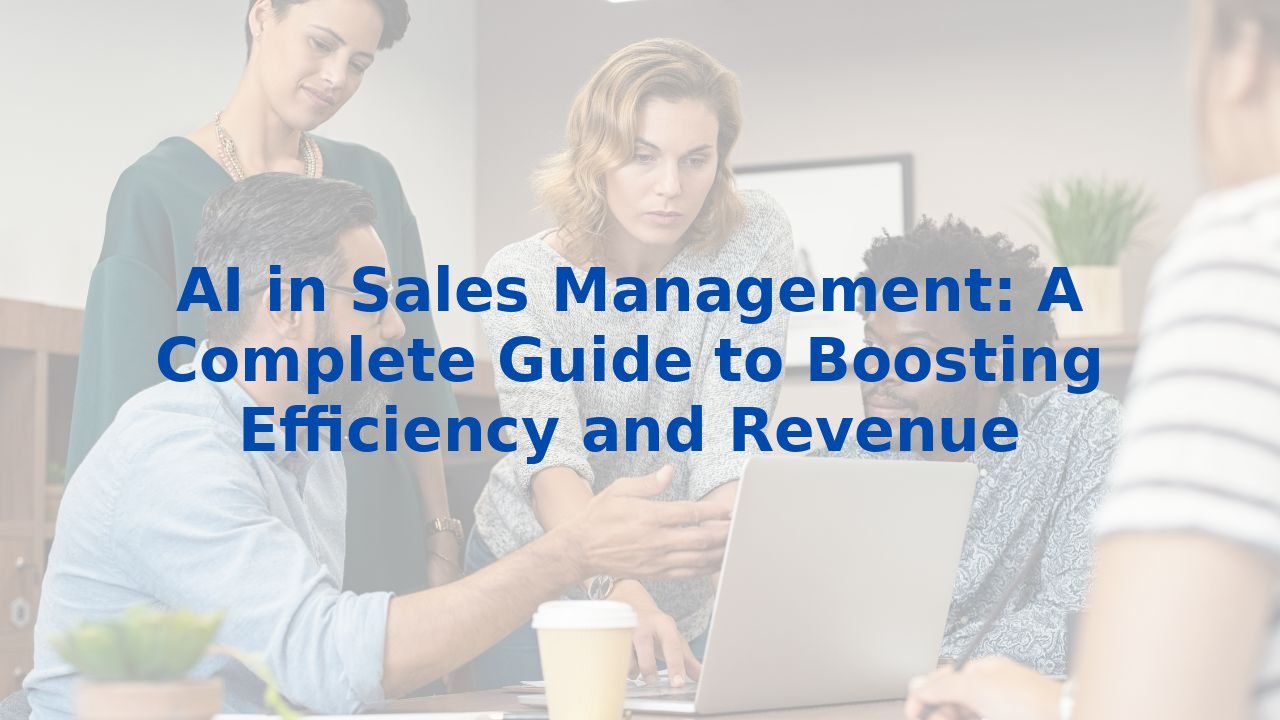AI in Sales Management: A Complete Guide to Boosting Efficiency and Revenue
The Impact of AI on Sales Management: Enhancing Efficiency and Revenue
Introduction
In the competitive business landscape, sales management stands as a cornerstone for driving revenue and meeting sales targets. Traditional sales management methods can often feel dated—time-consuming manual processes that not only drain resources but also risk stagnating growth. Today, the integration of Artificial Intelligence (AI) into sales management is not just a trend; it’s a transformational shift that enhances operational efficiency and revenue generation. In this guide, we will delve into how AI can reshape sales management processes and the profound benefits it brings to organizations.
Enhancing Efficiency in Sales Management
Automating Routine Tasks
Imagine a world where mundane tasks like data entry, lead generation, and follow-up emails vanish from your to-do list. AI makes this possible. By automating these repetitive activities, sales managers can dedicate their time to high-value engagements—strategizing and building relationships with customers. It’s not just time-saving; it’s about elevating the role of sales management to focus on what truly matters.
Predictive Analytics
One of the smartest features of AI is predictive analytics. By diving into historical data, AI can forecast sales trends and predict customer behavior. For sales managers, this insight is invaluable. It informs resource allocation and helps tailor marketing strategies, ensuring that every effort aligns with potential customer needs. In a world awash with data, making informed decisions becomes a game-changer.
Personalized Customer Engagement
We live in an age where personalization is key. AI can analyze customer data to create tailored marketing messages and recommendations. This personalized approach not only enhances customer engagement but significantly increases the odds of closing deals. Imagine speaking directly to a customer's needs—a sure way to build lasting relationships.
Real-Time Insights
In sales, timing is everything. AI systems provide real-time analytics, allowing sales managers to monitor and adjust strategies on the fly. This agility enables businesses to stay competitive, making quick adjustments to meet market demands. Embracing AI means embracing a responsive approach—one that proactively adapts to change.
Benefits of AI in Sales Management
Improved Accuracy
Human error is an unfortunate reality in any business process. AI helps mitigate this risk by processing vast amounts of data with pinpoint accuracy. The result? More reliable sales forecasts and enhanced decision-making capabilities. Trusting AI means trusting the data it provides—a powerful ally in a competitive landscape.
Enhanced Productivity
By automating routine tasks, sales teams can focus on strategic activities that drive growth. Increased productivity leads to better resource utilization, translating into higher output without the necessity of scaling up the workforce. AI essentially empowers your team to achieve more with less effort.
Cost Reduction
AI in sales management isn’t just about doing more; it’s about doing it smarter. Streamlined operations lead to significant cost savings, trimming excess time and resources needed for certain tasks. Every dollar saved can then be reallocated to fuel future growth.
Scalability
The beauty of AI tools lies in their ability to handle increased workloads without necessitating a proportional increase in staff. This scalability provides an opportunity for businesses to grow effortlessly while keeping operational costs in check. AI doesn’t just help you scale; it allows you to do so sustainably.
The Importance of Employee Training for AI
However, even the most powerful AI tools are only as effective as the people using them. Here’s where employee training comes into play.
Understanding AI Tools
To maximize the advantages of AI, employees must first understand how to leverage these tools effectively. Training programs should prioritize hands-on experience, allowing teams to automate tasks, analyze data, and derive meaningful predictions.
Data Interpretation
Insights from AI systems can be overwhelming. It’s crucial for employees to learn how to interpret this data effectively. Understanding predictive analytics and real-time data is key to making informed sales strategies that drive results.
Strategic Decision-Making
Training should extend beyond tool usage. Employees need to be trained in integrating AI insights into their strategic decision-making processes. The goal? To achieve better outcomes through a blend of human intuition and AI-driven data.
Continuous Learning
AI technology is in constant flux. Ongoing training programs are essential to ensure the workforce remains ahead of the curve. Empowering employees with the latest advancements leads to a culture of innovation that’s vital for long-term success.
Conclusion
The integration of AI into sales management isn’t just a fleeting trend; it's an opportunity to revolutionize how businesses operate. From automating routine tasks to providing real-time insights, AI stands as a significant ally in boosting efficiency and revenue generation. Yet, the successful adoption of AI hinges on strategic implementation and a steadfast commitment to training. By equipping employees with the skills necessary to harness AI's full potential, organizations position themselves for a future of sustained growth and innovation.



